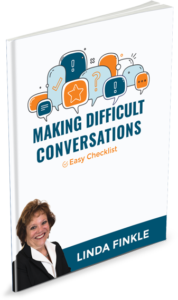I frequently get asked how to master having difficult conversations. I hear the same comments “I’m not good at having these conversations” or “they always end poorly”. What I hear often when the conversation is around an employee’s performance is “nothing changes anyhow”.
If I had the secret sauce to handling difficult conversations more effectively I would share it. Gosh, I don’t like having them myself and I think I do a pretty good job when I do have to have them. And I know, it’s arduous for others.
What I can offer is a few keys to make them less painful, to you and the person you are speaking with.
- 1. Remember to breathe. It’s the same idea as when you are exercising and realize you aren’t breathing enough. During exercise it brings oxygen to your muscles and brain and improves stamina and performance. When you are in a conversation you’d rather not be having, it’s just as important to breathe to fuel your brain and maintain an even keel during the conversation.
- 2. Be present. Pay attention to the person you are speaking with. It’s easy to let your mind wander and that’s a no-no here. I promise you the other person realizes when they don’t have your full attention. You may miss something they say or mishear something that impacts the conversation.
- 3. Maintain eye contact. One way you can demonstrate that you are present and paying attention is to maintain eye contact. Eye contact also says that you aren’t uncomfortable with what needs to be said.
- 4. Sit up. You want to feel in control of yourself and the situation. If you are slouching or have too casual a posture you aren’t demonstrating control. The other party may assume the conversation isn’t that important or serious. You don’t have to sit like you have a stick running up your back, but sit up so it’s clear the topic and conversation is important.
- 5. Watch your emotions. Difficult conversations are emotionally charged. Something went wrong or needs changed and the person you are speaking with is going to be unhappy. You are unhappy with the situation that caused the need to have the conversation and frustrated you have to take the time to handle. Emotions however do not belong in the conversations. They take away from the message itself and are what the other person remembers when the conversation ends.
- 6. Pay attention to your body language. Many people believe that body language often tells a different story than words and they believe what they see more than what they hear. Everything matters from how you cross your arms, to voice inflection, facial expressions, and more. Make sure your body aligns with your words.
- 7. Be authentic. Something I tell clients all the time is just be yourself. This doesn’t need to be a formal conversation. Yes you want them to know what needs to change, but you don’t have to come across as a jerk, unless of course you are truly one.
- 8. Know your message. It’s critical to be specific about what you want changed, handled differently etc. Saying “the report wasn’t complete” or “you aren’t accountable’ isn’t helpful. Provide examples. AND be sure you are specific about what you want different going forward. What would they be doing that would tell you they are accountable? What would be in the report when it’s complete?
- 9. Don’t end it unfinished. We are so ready to be over having these conversations we simply end them. What’s going to ensure they understood and are committed to taking action. Should they assume if you don’t say anything further you’re satisfied with their progress? Do you want to regroup again and in what time frame?
Mastering difficult conversations is well, difficult. Avoiding them, rushing through them, not being clear and not being present only amplify the possibility that neither you or the other person will be satisfied with the outcome.
While I can’t promise I have the secret recipe to make difficult conversations easy, I can promise I have tools to help them become easier.
Click the link below and download our checklist on Making Difficult Conversations Easy.

© Incedo Group, LLC








